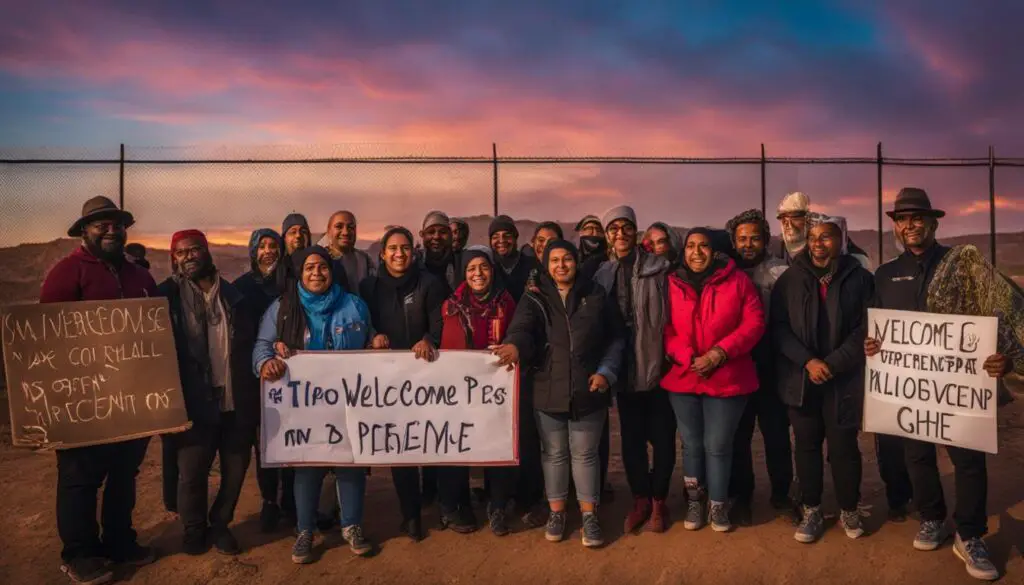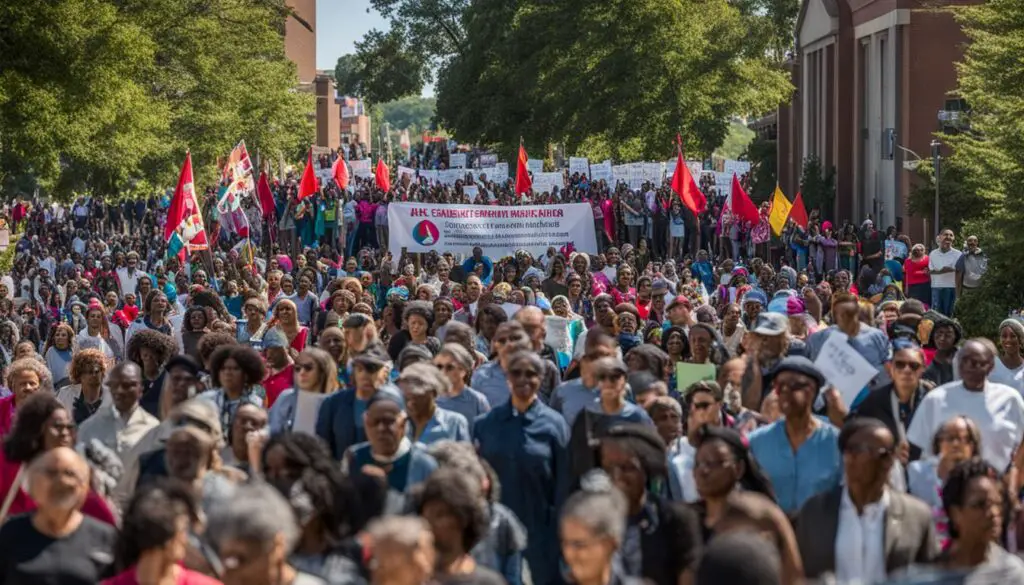As United Methodists, we are called to transform the world through faith-based advocacy. Our commitment to justice and mercy is rooted in scripture, which inspires and guides our advocacy efforts. The Bible teaches us to do justice, repair brokenness, and love one another, providing a strong foundation for our work. Through education and equipping, we build a movement for justice as advocates for the common good.
Key Takeaways:
- Faith-based advocacy involves personal, social, and civic righteousness.
- Scripture provides inspiration and practical ideas for effective advocacy.
- Church and Society plays a crucial role in educating and equipping advocates.
- Advocacy rooted in faith and grace can bring about a more compassionate America.
- We are called to stand with the marginalized and advocate for justice and mercy.
The Power of Grace in Advocacy
Grace is a transformative force that lies at the heart of faith-based advocacy. It empowers individuals to stand alongside their neighbors, to speak truth to power, and to demand justice and dignity for all. Rooted in the teachings of Jesus, grace inspires advocates to embody empathy, compassion, and forgiveness as they work towards a more just and equitable society.
Advocacy fueled by grace seeks to address the systemic injustices and inequalities that persist in our communities. It recognizes that true justice requires not only the correction of individual wrongs but also the transformation of social structures and policies. Grace sustains advocates on their journey towards justice, providing the strength and resilience needed to challenge oppressive systems and work towards lasting change.
“Grace compels us to advocate alongside our neighbors, calling leaders to account and demanding policies that reflect justice and dignity for all.”
By embodying grace in their advocacy efforts, individuals and faith-based organizations can create spaces for dialogue, build bridges of understanding, and foster meaningful change. Grace allows advocates to approach their work with humility, recognizing the inherent worth and dignity of every person. It opens doors for collaboration, encouraging diverse voices to unite in pursuit of common goals.
Grace in Action: Stories of Transformative Advocacy
The power of grace in advocacy is exemplified in the stories of those who have dedicated their lives to fighting for justice. From civil rights activists to community organizers, their work has brought about transformative change. For example, the Reverend Martin Luther King Jr., driven by the grace of God, led the fight for racial equality in the United States, inspiring millions to join the movement for civil rights.
Grace in advocacy is not limited to historic figures; it is alive and active today. Take the case of Maria, an immigrant rights advocate who, motivated by her faith, tirelessly works to support and protect undocumented individuals and families. Her advocacy is rooted in a deep sense of grace, compassion, and solidarity, as she fights for the rights and dignity of those who are often marginalized and overlooked.
These stories remind us of the transformative power of grace in advocacy. They inspire us to embrace grace as a foundational principle in our own advocacy efforts, ensuring that love, compassion, and justice guide our work towards a more equitable and inclusive world.

Faith-Based Advocacy for Asylum Seekers

Faith-based advocacy plays a crucial role in championing the rights and protection of asylum seekers, offering them hope and support in their search for safety and security. The work of organizations like World Relief exemplifies the core principles of grace, compassion, and justice that underpin faith-based advocacy. By standing with asylum seekers, these advocates embody the teachings of Jesus and strive to create a more inclusive and welcoming society.
Asylum seekers often face numerous challenges and obstacles, including legal complexities, language barriers, and social stigmatization. Faith-based advocates work diligently to address these issues by providing legal aid, language support, and community integration programs. Through their efforts, they not only advocate for fair and just treatment of asylum seekers but also empower them to rebuild their lives and contribute positively to their new communities.
The faith-based community’s commitment to asylum seekers goes beyond immediate assistance. It extends to raising awareness, mobilizing resources, and advocating for policy changes that prioritize the protection and well-being of those seeking refuge. By partnering with other stakeholders, such as government officials, community leaders, and international organizations, faith-based advocates strive to create systemic change that upholds the dignity and rights of asylum seekers.
Quotes:
“Injustice anywhere is a threat to justice everywhere.” – Martin Luther King Jr.
“I believe in human rights for everyone, and none of us is qualified until all of us are qualified.” – Maya Angelou
Table: Faith-Based Advocacy Initiatives for Asylum Seekers
| Initiative | Description |
|---|---|
| Legal Aid Programs | Providing legal representation and support to asylum seekers throughout the legal process, ensuring their rights are upheld. |
| Language and Cultural Assistance | Offering language classes and cultural orientation programs to help asylum seekers integrate into their new communities. |
| Advocacy for Policy Changes | Engaging in advocacy efforts to influence policymakers and promote policies that protect the rights and well-being of asylum seekers. |
| Community Support and Empowerment | Creating networks of support for asylum seekers, providing resources, mentorship, and opportunities for social and economic empowerment. |
Faith-based advocacy for asylum seekers is driven by the belief in the intrinsic worth and dignity of every individual, regardless of their background or circumstances. It is a powerful expression of grace and compassion, inspiring communities to come together and transform lives. Through their unwavering commitment, faith-based advocates are building a society that embraces and protects those seeking refuge, echoing the timeless message of love and justice.
Ending Gender-Based Violence through Faith-Based Advocacy

Faith-based organizations, such as World Relief, recognize the need to advocate for an end to gender-based violence. They convene Christian consciences to raise awareness, deepen empathy, and build a movement for justice. By speaking up for those who cannot speak for themselves, faith-based advocates work towards a world where gender-based violence is eradicated. This advocacy effort stems from the belief in the inherent dignity and worth of every individual.
The Urgency of Addressing Gender-Based Violence
Gender-based violence remains a pervasive issue in our society, affecting individuals of all ages, genders, and backgrounds. It encompasses a range of abuses, including domestic violence, sexual assault, and human trafficking. These acts of violence violate the fundamental rights and dignity of individuals, causing physical, emotional, and psychological harm. Faith-based advocacy plays a crucial role in addressing this crisis by shining a spotlight on gender-based violence, challenging societal norms, and working towards systemic change.
Building Awareness and Empathy
One key aspect of faith-based advocacy for ending gender-based violence is raising awareness and deepening empathy. By engaging congregations, communities, and individuals in conversations about the impacts of violence, faith-based organizations can help break the silence and stigma surrounding these issues. Through educational initiatives, workshops, and support programs, advocates foster empathy by encouraging others to listen, learn, and stand in solidarity with survivors. This empathetic understanding is vital for cultivating a society that supports and believes survivors, and actively works to prevent and respond to gender-based violence.
A Call for Justice and Restoration
At the heart of faith-based advocacy for ending gender-based violence is a call for justice and restoration. Inspired by the teachings of their faith, advocates recognize the importance of holding perpetrators accountable and providing support and healing for survivors. They work towards creating environments where victims can report abuse without fear, access essential services, and receive the support they need to rebuild their lives. Additionally, faith-based organizations play a crucial role in advocating for policies and legislation that address the root causes of gender-based violence, challenge harmful cultural norms, and promote gender equality.
| Statistics | Impact |
|---|---|
| 1 in 3 women worldwide experience physical or sexual violence | Violence against women has severe health, economic, and social consequences |
| 1 in 4 men in the United States have experienced some form of physical violence by an intimate partner | Men are also affected by gender-based violence and require support and resources |
| More than 72% of all trafficking victims globally are women and girls | Human trafficking is a form of gender-based violence that exploits and enslaves individuals |
By combining their faith with action, faith-based advocates are instrumental in the fight against gender-based violence. Through their unwavering commitment to justice, empathy, and restoration, they strive for a future where all individuals can live free from violence and oppression.
The Historical Commitment of the United Methodist Church to Social Justice
The United Methodist Church has a long and storied history of actively engaging in social justice issues. From its inception, the church has recognized the importance of advocating for the rights and well-being of all individuals, especially the marginalized and oppressed. This commitment to social justice is deeply rooted in the church’s understanding of its mission to love and serve the world, following the example of Jesus Christ.
Throughout its history, the United Methodist Church has taken a stand on various social justice issues, speaking out against injustice and working towards positive change. One notable example is the church’s strong opposition to slavery during the 19th century. Methodists played a key role in the abolitionist movement, advocating for the freedom and dignity of every human being. This commitment to justice has continued through the years, with the church addressing issues such as poverty, racism, and environmental stewardship.
“Our love of God is always linked with love of our neighbor, a passion for justice and renewal in the life of the world.”
The United Methodist Church’s Social Principles serve as a guide for its members in addressing contemporary social issues from a biblical and theological perspective. These principles provide a framework for understanding and responding to the complexities of the world, calling the church to advocate for human well-being, justice, and peace. The United Methodist Board of Church and Society, as an agency of the church, plays a vital role in advocating for social justice and coordinating efforts to promote systemic change.
Through its commitment to social justice, the United Methodist Church strives to create a more equitable and compassionate society. By following in the footsteps of Jesus Christ and embodying grace in their advocacy work, United Methodists continue to make a positive impact on the world, transforming lives and communities. Social justice is not just a passing trend for the church; it is an integral part of its identity and mission.
| Key Social Justice Issues | Actions and Initiatives |
|---|---|
| Racial Justice | Supporting Black Lives Matter movement, advocating for criminal justice reform, promoting racial reconciliation |
| Poverty and Economic Inequality | Addressing wealth disparities, supporting access to education and healthcare, advocating for fair wages |
| Environmental Stewardship | Promoting sustainable practices, advocating for policies to combat climate change, raising awareness about environmental justice |
| Immigration and Refugee Rights | Advocating for comprehensive immigration reform, providing support and resources to refugees and immigrants |

Key Quotes
“Our love of God is always linked with love of our neighbor, a passion for justice and renewal in the life of the world.” – United Methodist Social Principles
“Do all the good you can, by all the means you can, in all the ways you can, in all the places you can, at all the times you can, to all the people you can, as long as ever you can.” – John Wesley
Personal and Communal Transformation through Advocacy
Faith-based advocacy goes beyond the pursuit of justice and mercy. It has the power to transform both individuals and communities, fostering profound growth and renewal. By engaging in acts of compassion and justice, advocates not only impact the lives of others but also experience personal transformation.
Advocacy becomes a spiritual discipline, a way to connect with God and live out the love and grace we receive. As we advocate for the rights and dignity of others, our hearts and minds are opened, deepening our love for God and our commitment to serving others.
“Our love of God is always linked with love of our neighbor, a passion for justice and renewal in the life of the world.” – United Methodist Social Principles
Through advocacy, individuals are challenged to confront their own biases, prejudices, and privilege. It is an opportunity to reflect on one’s own role in perpetuating injustice and actively work towards dismantling oppressive systems. Advocacy has the transformative power to change the way we see the world and our place in it.
Advocacy as Community Transformation
Advocacy not only transforms individuals but also has the potential to bring about communal change. When advocates come together, their collective voices amplify the call for justice and mercy. Communities are mobilized, and movements are built to address systemic issues and create lasting impact.
Through advocacy, communities become agents of change, working towards a more just and compassionate society. Sense of unity and solidarity is fostered as people from diverse backgrounds join together for a common cause.
Advocacy: A Catalyst for Social Renewal
Advocacy is more than just addressing immediate needs; it is about addressing the root causes of injustice and inequality. By advocating for systemic change, advocates strive to create a society where justice and mercy become the foundation of all policies and practices.
This transformational approach to advocacy recognizes that lasting change requires a holistic approach—changing hearts, minds, and systems. It seeks to address the underlying conditions that perpetuate injustice, striving for comprehensive social renewal.

| Personal Transformation | Communal Transformation |
|---|---|
| Deepens empathy and compassion | Unites communities for a common cause |
| Challenges biases and prejudices | Amplifies the call for justice |
| Opens hearts and minds | Fosters a sense of unity and solidarity |
| Empowers individuals to take action | Creates sustainable social change |
Advocacy, rooted in faith and driven by grace, has the transformative power to change individuals, communities, and society as a whole. It is a catalyst for personal and communal growth, paving the way for a world that reflects justice, mercy, and compassion.
The Intersection of Grace and Advocacy in Literature and Religion
Grace is a powerful and transformative concept that resonates both in literature and religion. It is a force that inspires and guides faith-based advocacy, as it promotes empathy, compassion, and the pursuit of justice. In literature, grace often takes center stage, illustrating its ability to bring about redemption, forgiveness, and personal growth. Similarly, in religion, grace is viewed as a divine gift that empowers individuals to embody love, kindness, and mercy towards others.
In literature, authors often depict grace as a catalyst for change and transformation. Characters experience grace in various forms, such as unexpected acts of kindness or moments of profound realization. These encounters with grace prompt individuals to reflect on their actions, seek forgiveness, and strive for moral growth. Grace in literature serves as a reminder of the potential for redemption and the importance of extending grace to others in our advocacy efforts.
Religion, too, emphasizes the role of grace in advocating for justice and mercy. It is through grace that individuals are enabled to live out their faith and embody the values taught by their religious traditions. Grace inspires believers to respond to the needs of others, stand up against injustice, and work towards creating a more compassionate society. Faith-based advocacy grounded in grace is a powerful force that seeks to address systemic issues and uplift the marginalized and vulnerable.
When grace intersects with advocacy, it creates a dynamic and transformative force. It compels individuals to extend compassion and mercy to those in need, challenging societal norms and demanding justice. Through literature and religion, we can explore and understand the profound connection between grace and advocacy, inspiring us to embrace grace in our own lives and advocate for justice and mercy for all.
Embodying Grace: Quotes that Inspire Faith-Based Advocacy
Grace is the catalyst that ignites faith-based advocacy, inspiring individuals to champion justice and mercy for all. Throughout history, influential figures have shared profound insights on the power of grace in the pursuit of a more compassionate society. These grace quotes encapsulate the essence of faith-based advocacy, serving as a beacon of inspiration for advocates committed to transforming the world.
“Our love of God is always linked with love of our neighbor, a passion for justice and renewal in the life of the world.” – Desmond Tutu
This quote from Archbishop Desmond Tutu reminds us that faith-based advocacy is grounded in love for both God and our neighbors. It highlights the interconnectedness of our spiritual convictions and our responsibility to strive for justice and renewal in the world around us. By embodying grace in our advocacy efforts, we demonstrate our commitment to the well-being of all individuals, fostering a more just and compassionate society.
Another influential figure, Mahatma Gandhi, shared a timeless perspective on grace and advocacy:
“In a gentle way, you can shake the world.” – Mahatma Gandhi
Gandhi’s quote reminds us that faith-based advocacy is not about force or aggression but about embodying grace in our actions. By embracing gentleness and compassion, we have the power to create meaningful change and shake the foundations of injustice. Through our advocacy, we can inspire others to join us in the pursuit of justice and mercy, ultimately transforming the world one gentle step at a time.
These grace quotes resonate with the spirit of faith-based advocacy, inspiring us to stand up for what is right, extend grace to others, and work tirelessly towards a more just and compassionate society.
The Power of Grace Quotes
Grace quotes have the ability to stir hearts, inspire action, and fortify the spirit of faith-based advocacy. Here are a few more quotes that encapsulate the transformative power of grace:
- “Grace isn’t a little prayer you say before receiving a meal. It’s a way to live.” – Jacqueline Winspear
- “Grace isn’t just a prayer you chant before receiving a meal. It’s a way to live, embracing life’s imperfections and extending kindness to all.” – Unknown
These quotes remind us that grace is not just a concept to be understood; it is a way of life. Through our actions, attitudes, and advocacy efforts, we can embody grace and make a significant impact on the lives of others.
| Table of Grace Quotes |
|---|
| “Our love of God is always linked with love of our neighbor, a passion for justice and renewal in the life of the world.” – Desmond Tutu |
| “In a gentle way, you can shake the world.” – Mahatma Gandhi |
| “Grace isn’t a little prayer you say before receiving a meal. It’s a way to live.” – Jacqueline Winspear |
| “Grace isn’t just a prayer you chant before receiving a meal. It’s a way to live, embracing life’s imperfections and extending kindness to all.” – Unknown |
Conclusion
Faith-based advocacy rooted in grace is a powerful force for justice and mercy. As United Methodists, we understand our call to transform the world involves personal, social, and civic righteousness. By drawing inspiration from scripture, we are reminded of the need to do justice, repair brokenness, and love one another. Through grace, we are compelled to advocate alongside our neighbors, demanding policies that reflect justice and dignity for all.
Faith-based advocacy is not limited to specific issues but extends to addressing the underlying conditions that perpetuate injustice and inequality. It is a means to live out the love of God and participate in the renewal of society. By embodying grace in our advocacy efforts, we can work towards a more just and compassionate America, where every individual’s rights and dignity are upheld.
The commitment to grace in advocacy transcends boundaries and denominations. It unites individuals in the pursuit of a better world, where justice and mercy prevail. Together, we can be the change we seek. Let us continue to educate and equip advocates, build a movement for justice, and transform society through faith-based advocacy.
FAQ
What is faith-based advocacy?
Faith-based advocacy is the practice of advocating for justice and mercy based on one’s religious beliefs and values. It involves using faith as a guide to address social issues and work towards positive change in society.
How does grace play a role in faith-based advocacy?
Grace is a central concept in faith-based advocacy. It compels advocates to treat others with compassion and empathy, and it sustains them on their journey towards justice. By embodying grace in their advocacy efforts, individuals can effectively work towards creating a more compassionate America.
What is the role of faith-based organizations in advocating for asylum seekers?
Faith-based organizations like World Relief play a crucial role in advocating for the rights and protection of asylum seekers. They intercede on behalf of those who are suffering and work to influence those in power to save lives. By standing with asylum seekers, faith-based advocates exemplify the grace and compassion taught by Jesus.
How do faith-based organizations address gender-based violence through advocacy?
Faith-based organizations convene Christian consciences to raise awareness, deepen empathy, and build a movement for justice in ending gender-based violence. By speaking up for those who cannot speak for themselves, faith-based advocates work towards a world where gender-based violence is eradicated and uphold the inherent dignity and worth of every individual.
What is the historical commitment of the United Methodist Church to social justice?
The United Methodist Church has a rich history of engaging in social justice issues. The church has consistently expressed its concern for societal ills, from opposing slavery to addressing inhumane prison conditions. The United Methodist Board of Church and Society serves as an agency that advocates for human well-being, justice, and peace, fulfilling the church’s call to advocate for justice and mercy.
How does faith-based advocacy contribute to personal and communal transformation?
Faith-based advocacy encompasses both personal and communal transformation. By engaging in spiritual disciplines and acts of compassion and justice, individuals grow in their love for God and their commitment to serving others. Advocacy becomes a means to live out the love of God and participate in the renewal of society.
What is the intersection of grace and advocacy in literature and religion?
Grace is a central theme in both literature and religion. In literature, grace is often depicted as a transformative force that brings about redemption and forgiveness. In religion, grace is considered a divine gift that empowers individuals to live a life of compassion and mercy. The concept of grace resonates with the belief in advocating for justice and extending grace to others, reflecting the values emphasized in faith-based advocacy.
Are there any quotes that inspire faith-based advocacy?
Yes, numerous quotes capture the essence of grace and its connection to faith-based advocacy. Quotes like “Our love of God is always linked with love of our neighbor, a passion for justice and renewal in the life of the world” serve as reminders of the integral role grace plays in advocating for justice and mercy. These quotes inspire individuals to embody grace in their advocacy efforts and work towards a more just and compassionate society.
How can faith-based advocacy contribute to a more just and compassionate society?
Faith-based advocacy, rooted in grace, is a powerful force for justice and mercy. By understanding our call to transform the world and drawing inspiration from scripture, faith-based advocates can effectively advocate for the rights and dignity of all individuals. The commitment to grace in advocacy transcends boundaries and denominations, uniting individuals in the pursuit of a more compassionate America.

